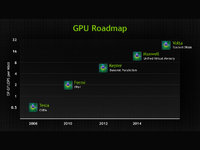- Joined
- Aug 20, 2006
- Messages
- 13,000
Some folks think that a new chip order sent to TSMC is hinting that Volta will, in fact, be forged with 12nm technology, as rumored by earlier reports. VideoCardz has noted that these chips must be the Volta GV100, Xavier SoC, or both. The latter was originally said to be manufactured in the 16nm FinFET process.
Taiwan Semiconductor Manufacturing Company (TSMC) has landed orders for high performance computing (HPC) chips for AI applications from NVIDIA and Qualcomm, respectively, according to a Chinese-language Commercial Times report. TSMC will fabricate NVIDIA’s next generation Volta GPU using a 12nm process, said the paper, which added that the Volta GPU will be paired with NVIDIA’s Xavier supercomputer chips for self-driving car applications. TSMC also produces the 256-core NVIDIA Pascal GPU and dual-core Denver 2 CPU for NVIDIA’s recently released JetsonTX2 supercomputer platform, using a 16nm process, the paper indicated.
Taiwan Semiconductor Manufacturing Company (TSMC) has landed orders for high performance computing (HPC) chips for AI applications from NVIDIA and Qualcomm, respectively, according to a Chinese-language Commercial Times report. TSMC will fabricate NVIDIA’s next generation Volta GPU using a 12nm process, said the paper, which added that the Volta GPU will be paired with NVIDIA’s Xavier supercomputer chips for self-driving car applications. TSMC also produces the 256-core NVIDIA Pascal GPU and dual-core Denver 2 CPU for NVIDIA’s recently released JetsonTX2 supercomputer platform, using a 16nm process, the paper indicated.
![[H]ard|Forum](/styles/hardforum/xenforo/logo_dark.png)
